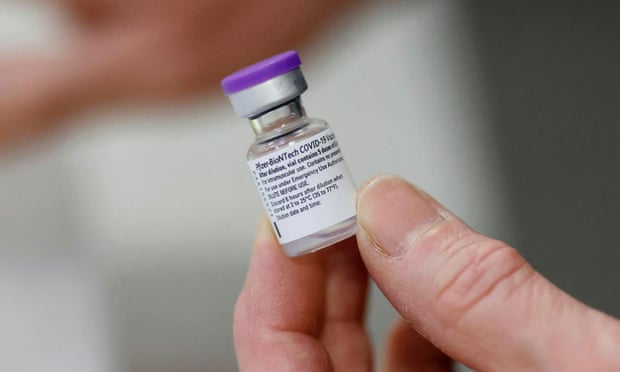Until now almost nobody in the UK has been able to choose which Covid vaccine they were given – even, apparently, cheerleaders for the homegrown Oxford/AstraZeneca jab such as Boris Johnson and the NHS England boss Simon Stevens, who received it very publicly in a bid to boost confidence earlier this year.
But now all adults under-30 are to be offered an alternative to the AstraZeneca jab and the effect of that may be to undo some of Johnson’s and Stevens’s work. That age group – as long as they are fit and healthy – run very little risk from Covid. The reasoning is that they could possibly run a greater risk from the very rare side-effects of the jab, which are blood clots allied to low platelets. That’s not because they are more likely to get blood clots – just less likely to end up in hospital from Covid.
The blood clots causing concern are very rare, affecting four in a million people who have had the vaccine in the UK. Of 79 people who have suffered them, 19 have died, and only three of these were aged under 30. But for people over 30, the risks of Covid rise. And there is no doubt that the AstraZeneca vaccine saves lives – 6,000 so far in the UK, according to the Medicines and Healthcare products Regulatory Authority (MHRA), which approved it.
It is not the MHRA that has said young adults should have the choice of an alternative. Both the UK regulator and its EU equivalent, the European Medicines Agency (EMA), say the vaccine is safe and effective, the side-effects are rare and people should carry on having it. It is the Joint Committee on Vaccines and Immunisation (JCVI), an independent body of scientists that advises the UK government, which has recommended giving under-30s another option if it is available.
Quick Guide
Vaccines: how effective is each one?

Pfizer/BioNTech
Country US/Germany
Efficacy 95% a week after the second shot. Pfizer says it is only 52% after the first dose but the UK’s Joint Committee on Vaccination and Immunisation (JCVI) says this may rise to 90% after 21 days.
Doses Clinical trials involved two doses 21 days apart. The UK is stretching this to 12 weeks.
Oxford/AstraZeneca
Country UK
Efficacy 70.4% 14 days after receiving the second dose. May have up to 90% efficacy when given as a half dose followed by a full dose. No severe disease or hospitalisations in anyone who received the vaccine. There have been concerns it is less effective against the South African variant of the coronavirus, and some countries have suggested that it is less-effective against either older patients or younger patients.
A UK government-funded study of care home residents in England found that their risk of infection with Covid-19 – either symptomatic or asymptomatic – fell by 62% five weeks after they received their first Oxford/AstraZeneca or Pfizer/BioNTech vaccine dose.
Doses Two, four to 12 weeks apart
Moderna
Country US
Efficacy Phase 3 trial results suggest 94.1%.
Doses Two, 28 days apart
Novavax
Country US
Efficacy Phase 3 trials suggest 89.3%.
Doses Two
Janssen (part of Johnson & Johnson)
Country US
Efficacy 72% in preventing mild to moderate cases in US trials but 66% efficacy observed in international trials. 85% efficacy against severe illness, and 100% protection against hospitalisation and death.
Doses: One, making it unique among Covid vaccines with phase 3 results so far
Wednesday’s developments may have made it look as though the UK, which was the world’s first country to license the Oxford/AstraZeneca Covid vaccine and has stoutly supported its developers through thick and thin over the last six months, is now taking a tougher stance than Europe. But in reality that is not so.
The EMA has listed the rare blood clots as an official side-effect and said patients and doctors should know what symptoms to look out for but, like the MHRA, it has not recommended any change in vaccination policy.
However, many European countries have taken action already. France, Germany and Spain already restrict the vaccine (to over-55s, over-60s and those aged 55-65 respectively), while the Netherlands and much of Scandinavia have suspended the vaccine entirely.
So far, people in the UK have gratefully accepted whichever vaccine they were offered. You are not told until you arrive at the vaccination centre which one it will be. The actual differences in efficacy between the AstraZeneca and Pfizer jabs are slight – the variation has as much to do with technicalities such as the definition of illness in the trials.
But it is easy to imagine that people’s readiness to have what they are given may change. The “course correction”, as the deputy chief medical officer, Prof Jonathan Van-Tam calls it, may be slight but it will probably have a disproportionate impact on confidence – not just in the UK, where there are other vaccine options, but in parts of the world where there are not, and where the affordable and easy-to-use AstraZeneca vaccine is the only life-saver available.
This content first appear on the guardian
